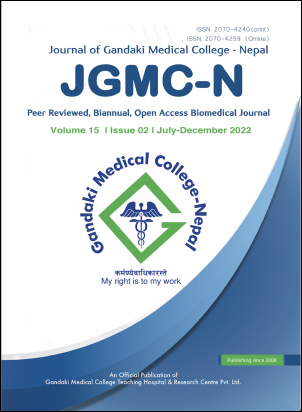Shock Index in predicting fluid resuscitation in patients with hypovolemic shock
DOI:
https://doi.org/10.3126/jgmcn.v15i2.50286Keywords:
Blood transfusion, emergency, fluid resuscitation, hypovolemic shock, shock indexAbstract
Introduction: Hypovolemic shock is diagnosed by the signs of hemodynamic instability and when the source of volume loss is obvious. Among various types, hypovolemic shock is the most common which results either from the loss of blood from hemorrhage or from the loss of plasma alone due to extravascular fluid sequestration or gastrointestinal, urinary, and insensible losses. The objective of this research was to find the use of shock index in predicting fluid resuscitation in patients with hypovolemic shock.
Methods: An analytical cross-sectional study was conducted among 120 patients with hypovolemic shock visiting to the Emergency department of College of Medical Sciences and Teaching Hospital from July 2022 to September 2022. Data was collected from patients and checked for completeness, accuracy and then entered and analyzed using SPSS-20. Data was analyzed using descriptive and inferential statistical tools. P-value <0.05 was considered as statistically significant.
Results: Out of 120 patients, majority of the patients were >50 years. Minority of the patients only required blood transfusion. Among total patients 60% of the patients were admitted in ICU, 25% of them were admitted in ward and 4.17% of them were expired. In 60% cases shock index was <1 while in 40% case shock index was ≥1. The number of patients receiving blood transfusion at ER increased with increase in shock index and that the number of patients with hypovolemic shock are admitted in hospital more in shock index category ≥1 as compared to shock index <1 (p-value <0.05).
Conclusions: This study reveals that shock index is accurate in predicting the amount of fluid. The risk of all clinical complication is increased with increase in shock index.
Downloads
Downloads
Published
How to Cite
Issue
Section
License
Copyright (c) 2022 Manohar Pradhan, Alok Pradhan, Hari Prasad Upadhyay, Ayasha Shrestha

This work is licensed under a Creative Commons Attribution-NonCommercial 4.0 International License.
This license allows reusers to distribute, remix, adapt, and build upon the material in any medium or format for noncommercial purposes only, and only so long as attribution is given to the creator.

